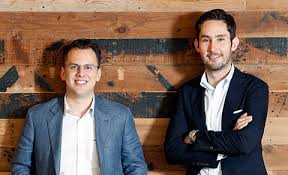Instagram founders Systrom and Krieger leaving Facebook-owned firm
The
co-founders of photo-sharing giant Instagram, Kevin Systrom and Mike Krieger,
are both leaving the firm.
Mr Systrom,
chief executive, said they were departing to "explore our curiosity and
creativity again".
Instagram,
purchased by Facebook in 2012 for $1bn (£760m) in cash and stock, has more than
a billion users.
There had
been reports of tension between the pair and Facebook, and the departures add
to what has been a troubling year for the parent company.
Mr Systrom,
34, the CEO, and Mr Krieger, 32, the chief technical officer, started the image
sharing site in 2010 and continued to run the service after it was acquired by
Facebook.
What have
the pair said?
Not a great
deal. They reportedly only told the Facebook leadership on Monday so the
departure appears pretty sudden.
In a blog
post, Mr Systrom said: "We're now ready for our next chapter."
He added:
"Building new things requires that we step back, understand what inspires
us, and match that with what the world needs; that's what we plan to do."
There was no
animosity in the blog post. Mr Systrom said the pair both remained
"excited for the future of Instagram and Facebook".
Over 8 years ago, Kevin and I started
Instagram, hoping to build something that would bring out people’s creativity
and spirit for exploration. Now it’s time for the next chapter. A huge thank
you to everyone in the community who we’ve met along the way.
https://t.co/9Omyj6VHbe
— Mike Krieger (@mikeyk) September 25, 2018
CEO Mark
Zuckerberg said in a statement that Instagram reflected the founders'
"combined creative talents".
"I've
learned a lot working with them for the past six years and have really enjoyed
it," he said. "I'm looking forward to seeing what they build
next."
So what's
behind the departures?
Owojela’s
Blog understands that tension started to grow between Mr Systrom and Mr
Zuckerberg as far back as 2014 when Facebook purchased WhatsApp.
The social
network spent $19bn on the chat app in 2014, and Instagram's co-founder is said
to have become concerned that he had sold out too soon.
He also saw
Snapchat prosper - an app Facebook had tried and failed to take over.
"The
irony is that Kevin built the more successful product," one insider
commented.
There are
reports that Mr Systrom had sought to maintain Instagram's independence and
that this trickled down to make staff on Facebook and Instagram less inclined
to be collaborative.
But there
was pressure for their two apps to become more integrated, and features were
added allowing, for example, Instagram Stories - videos that self-destruct
after 24 hours - to be cross-posted to Facebook.
Despite
remaining Instagram's figurehead at product launches and other public
appearances, Mr Systrom's influence declined over time, a source told the BBC,
as more Facebook executives were transferred to the photo service.
"Kevin
maybe didn't have the fight in him anymore and probably didn't agree with some
of the product decisions," the source said. "This is just the natural
end to an era."
So what will
become of Instagram now?
The firm was
quite deliberately treated like a separate company owned by Facebook, rather
than merely a department or division, because it was Instagram's culture that
made it such a valuable acquisition.
Kevin
Systrom and Mike Krieger were responsible for that culture - the entire feel of
an app that was in many respects the anti-Facebook. It lacked the clutter and
noise that had made Facebook bloated in many people's eyes.
But slowly,
in recent years, the Instagram app started putting on that weight. Algorithmic
ordering of the timeline... and ads, so many ads.
One of the
names being touted as the next boss of Instagram is Adam Mosseri. He's
currently head of product, and has a CV that some of Instagram's loyal users
might find ominous - he was formerly in charge of Facebook's Newsfeed.
Indeed not.
In fact it echoes what happened with WhatsApp.
Its chief
executive and co-founder Jan Koum said in April he would quit the popular
messaging service he co-founded in 2009 and sold to Facebook in 2014.
Oddly, Mr
Koum's departure statement is similar to Mr Systrom's.
Analysts of
that move also spoke of clashes with Facebook.
Mr Koum's
departure sparked an executive reshuffle that saw the tightening of Mr Zuckerberg's
control over operations.
Facebook has
been under intense pressure this year over the issues of safeguarding customer
data and the misuse of its platforms by those wishing to spread fake news,
including for political ends.
In March, in
the week Mr Zuckerberg apologised for the handling of a historic data breach,
Facebook ended $58bn (£44bn) lower in value.



Comments